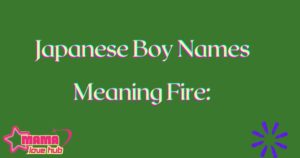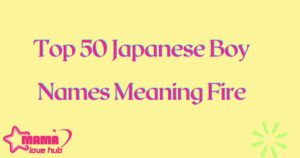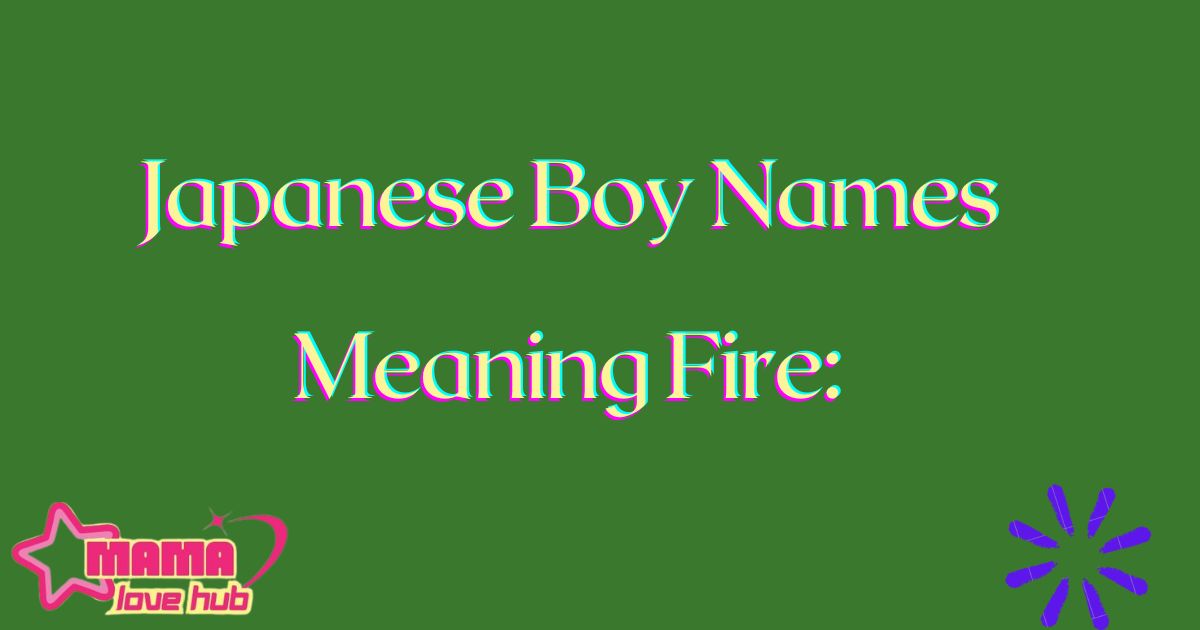Japanese Boy Names Meaning Fire: Before 50 Names with Meanings
Fire holds immense significance in Japanese culture, symbolizing strength, passion, and transformation. Naming a child is a cherished tradition in Japan, with each name carefully selected to reflect values, aspirations, and sometimes even elemental qualities like fire. In this article, we delve into the world of Japanese boy names meaning fire, exploring their meanings, symbolism, and cultural significance.

Introduction to Japanese Boy Names Meaning Fire
Names carry profound meanings in Japanese culture, often embodying the aspirations parents have for their children. Fire, as an elemental force, represents energy, vitality, and the potential for both destruction and creation. Japanese boy names inspired by fire embody these traits, symbolizing courage, passion, and resilience.
Importance of Names and Their Meanings in Japanese Culture
In Japan, names are chosen meticulously, considering their meanings and how they resonate with familial values. The significance of a name extends beyond mere identification; it shapes an individual’s identity and influences their journey through life. Japanese parents often select names that convey positive attributes, such as strength, wisdom, or in this case, the fiery spirit.
Symbolism of Fire in Japanese Culture
Fire holds a prominent place in Japanese mythology and folklore, representing purification, illumination, and the cycle of life. From the mythical fire god Kagutsuchi to the sacred flames of traditional rituals, fire symbolizes transformation and renewal. Japanese boy names inspired by fire draw from this rich symbolism, evoking the spirit of endurance and resilience.
Top 50 Japanese Boy Names Meaning Fire

Here are 50 Japanese boy names that capture the essence of fire, along with their meanings:
Akio (明夫) – Bright Man
Enji (炎児) – Flame Child
Kaen (火焔) – Flame
Kagutsuchi (カグツチ) – God of Fire
Kaji (火事) – Fire
Kazan (火山) – Volcano
Kifumi (火文) – Fire Letter
Kouen (光炎) – Bright Flame
Masanori (正則) – Just Precept
Satoru (悟) – Enlightenment
Shoma (翔馬) – Soaring Horse
Tatsuo (達夫) – Accomplished Man
Toraichi (虎一) – Tiger One
Toshio (敏夫) – Intelligent Man
Yūdai (悠大) – Great Serenity
Yūjin (勇仁) – Courageous Benevolence
Yuuma (悠真) – True Serenity
Shiro (四郎) – Fourth Son
Hinata (日向) –
Hinata (日向) – Sunny Place
Kaen (火炎) – Blaze
Roka (炉火) – Hearth Fire
Ran (乱) – Revolt
Sora (空) – Sky
Katsuo (勝男) – Victorious Man
Kazuki (一輝) – Radiance
Aiden (愛電) – Love, Lightning
Akira (明) – Bright
Kazuma (一馬) – One, Horse
Ken (健) – Healthy, Strong
Kenta (健太) – Healthy, Plump
Leo (炎夫) – Flame Man
Renji (連次) – Next in Line
Takeru (武) – Warrior
Taiga (大火) – Big Fire
Tatsuya (達也) – Achieve, Also
Yūma (夢) – Dream
Conclusion
Selecting a name for your child is an extremely significant and intimate choice. Japanese boy names meaning fire not only carry the elemental power of fire but also symbolize strength, resilience, and passion. Each name on this list reflects the rich cultural heritage of Japan and the enduring spirit of its people. Whether you seek a name that exudes brightness like “Akio” or one that embodies the fiery spirit like “Enji,” may your choice inspire and empower your child throughout their life journey.
FAQs
What significance does fire hold in Japanese culture?
Fire symbolizes purification, transformation, and the cycle of life in Japanese culture. It is often associated with strength, passion, and renewal.
How do Japanese parents pick their kids’ names?
Japanese parents carefully select names based on their meanings, considering values, aspirations, and cultural significance. They often seek names that embody positive attributes or reflect familial traditions.
Are Japanese names typically gender-specific?
Yes, Japanese names can be gender-specific, although some names are unisex. However, certain suffixes or characters may indicate the gender of the individual.
Do Japanese names always have meanings?
Yes, most Japanese names have meanings, and parents often choose names with significant meanings that resonate with their hopes for their children’s future.
Are there cultural differences in naming practices in Japan?
Yes, naming practices in Japan vary based on cultural, regional, and familial traditions. Some families may follow traditional naming conventions, while others may incorporate modern or unique names into their choices.

